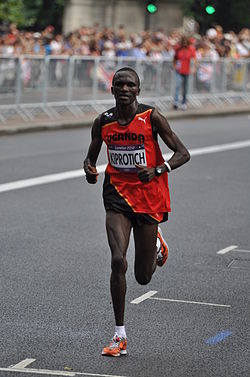Athletics at the 2012 Summer Olympics – Men's marathon
| Men's marathon at the Games of the XXX Olympiad | ||||||||||
|---|---|---|---|---|---|---|---|---|---|---|
 Winner Stephen Kiprotich near the end of the course. | ||||||||||
| Venue | Marathon course, central London | |||||||||
| Date | 12 August | |||||||||
| Competitors | 105 from 67 nations | |||||||||
| Winning time | 2:08:01 | |||||||||
| Medalists | ||||||||||
| ||||||||||

The men's marathon at the 2012 Olympic Games in London took place on the Olympic marathon street course on 12 August, the final day of the Games.[1] One hundred and five athletes from 67 nations competed.[2] The event was won by Stephen Kiprotich of Uganda, the nation's first Olympic men's marathon victory and the nation's only medal in 2012. Kenya earned its fourth and fifth medals in five Games, with Abel Kirui's silver and Wilson Kipsang's bronze.
As is customary, the men's marathon medals were presented as part of the Closing Ceremony, which took place later that day, in the Olympic Stadium – the last medal presentation of the Games.
Summary
[edit]Stephen Kiprotich from Uganda won the gold medal — the country's only medal at the 2012 Games. Abel Kirui and Wilson Kipsang, both from Kenya, took silver and bronze respectively.[3] Twenty athletes did not finish the race, which took place on a warm and sunny day.[4][5]
The race started off slowly. In the first 5 miles (8.0 km), Brazilian runner Franck Caldeira broke away on two occasions, only to get swallowed up by the pack. Between 10K and 12K, Wilson Kipsang Kiprotich moved to the front in a more serious breakaway. The large pack broke up into a small chase pack of eight runners, primarily East African. With a fast 7 miles (11 km), Kipsang Kiprotich opened up a gap of about 15 seconds, which lasted for the next 10 miles but never increased significantly.[6] The chase group shrunk to Abel Kirui and Stephen Kiprotich, with Ayele Abshero just behind. While Abshero did not gain contact, the other three formed a lead pack. The two Kenyan teammates ran together, with the Ugandan trailing slightly. By 35K, the group of three had over a minute gap on the next competitor, Marilson dos Santos. At the 22 miles (35 km) marker, Kiprotich touched his leg as if he were struggling and he fell back a few seconds. At the 23 miles (37 km) marker, Kiprotich moved past the two Kenyans. His next mile was 4:42, opening up a 17-second gap on Kirui, with Kipsang falling back. Kiprotich extended his lead by 9 seconds and picked up a Ugandan flag before crossing the finish line.[7]
Background
[edit]This was the 27th appearance of the event, which is one of 12 athletics events to have been held at every Summer Olympics. Returning runners from the 2008 marathon included sixth-place finisher Viktor Röthlin of Switzerland, eighth-place finisher Yared Asmerom of Eritrea, and tenth-place finisher Ryan Hall of the United States. The 2004 silver medalist Meb Keflezighi of the United States, who had not competed in Beijing, also returned. Abel Kirui of Kenya had won the past two world championships in 2009 and 2011. His countryman Patrick Makau Musyoki had set the world record in 2011, but could not finish the 2012 London Marathon due to injury and was not selected for the Kenyan team. Wilson Kipsang and Emmanuel Mutai joined Kirui on the Kenyan team instead; Kipsang was the favorite in the hundred-plus runner field.[2]
Iceland made its first appearance in Olympic men's marathons. South Sudan had one runner appear as an Independent Olympic Athlete. The United States made its 26th appearance, most of any nation, having missed only the boycotted 1980 Games.
Competition format and course
[edit]As all Olympic marathons, the competition was a single race. The marathon distance of 26 miles, 385 yards was run over a course that started and finished on The Mall in central London. Runners completed one short circuit of 2.219 miles (3.571 km) around part of the City of Westminster and then three longer circuits of 8 miles (13 km) around Westminster, the Victoria Embankment and the City of London. The course was designed to pass many of London's best-known landmarks, including Buckingham Palace, Trafalgar Square, St Paul's Cathedral, the Bank of England, Leadenhall Market, the Monument, the Tower of London and the Houses of Parliament.[8]
Records
[edit]Prior to this event[update], the existing world and Olympic records stood as follows.
| World record | 2:03:38 | Berlin, Germany | 25 September 2011 | |
| Olympic record | 2:06:32 | Beijing, China | 24 August 2008 |
No new world or Olympic records were set during the competition.
Schedule
[edit]All times are British Summer Time (UTC+1)
| Date | Time | Round |
|---|---|---|
| Sunday, 12 August 2012 | 11:00 | Final |
Results
[edit]References
[edit]- ^ "Athletics – Summer Olympic Sport". london2012.com. 29 May 2018. Archived from the original on 5 September 2012. Retrieved 11 May 2012.
- ^ a b "Marathon, Men". Olympedia. Retrieved 31 August 2020.
- ^ "Kiprotich claims gold for Uganda". The Irish Times. 12 August 2012.
- ^ "Stephen Kiprotich wins gold for Uganda". BBC Sport. 12 August 2012. Retrieved 4 July 2013.
- ^ "Stephen Kiprotich of Uganda wins marathon". USA Today. 12 August 2012. Retrieved 4 July 2013.
- ^ "Stephen Kiprotich becomes Uganda's second ever Olympic gold medallist with historic men's marathon victory". Daily Telegraph. 12 August 2012. Retrieved 4 July 2013.
- ^ "Stephen Kiprotich's Olympic marathon win gives Uganda second gold ever". Guardian. 12 August 2012. Retrieved 4 July 2013.
- ^ "Olympic Documents – Annual Reports, Code of Ethics & more" (PDF). london2012.com. 2 February 2018. Archived from the original (PDF) on 19 August 2012. Retrieved 12 August 2012.
